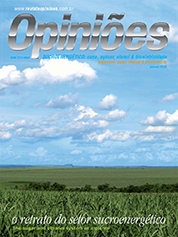Carlos Eduardo de Siqueira Cavalcanti
Head of the Biofuel Department of BNDES
Op-AA-25
Challenges for sustainable growth
The recent crisis that impacted the sugar-based energy industry left a set of lessons for the business community and its main financial agents. Although some difficulties remain, also with respect to again attaining the pre-crisis credit levels, one can already notice a bigger number of inquiries relative to new projects, in comparison with the first semester of 2009.
Particularly at this point in time, one notices the predominance of new investments in energy co-generation capacity. This surely is one of the crisis’ consequences, given that higher stability and predictability of cash flows related to the sale of energy stand in contrast to price fluctuations so inherent to the sugar and ethanol markets.
Most of 2009 was dedicated to managing the crisis, having resulted in an unprecedented work effort by the BNDES and the main banks that operate in the industry. One may state that in practical terms this work has curently been successfully concluded. Nevertheless, the BNDES in 2009 practically upheld the same level of disbursements as in the previous year, in a magnitude of US$ 6.5 billion.
Thus, it closed the 2007-09 triennium with a global disbursement volume of close to R$ 17 billion for new projects or the expansion of production capacity, in what constitutes one of the largest supports provided industry sectors in the Bank’s recent history. Some parameters guide and will continue to guide BNDES’ activities in the sugar-based energy industry.
They essentially comprise definitions of business strategies for growth, management standards – mainly financial – and on governance and sound social and environmental practices. Furthermore, the Bank has sought to act proactively in the industry with respect to the introduction of innovative practices and processes that seek to aggregate value to companies’ products.
Another sensitive parameter for the Bank, more exogenous in nature, but strategic for the country, refers to the consolidation of ethanol as an alternative solution for energy matrixes of other countries, and to how this aspect may influence the internationalization process of Brazilian companies.
As related to business strategies and new competitiveness standards resulting from the consolidation proc-ess, the BNDES is closely monitoring the industry’s main movements, whenever possible, through its traditional debt or equity instruments. One lacks the perception of a winning consolidation model, given the high degree of decentralization that still characterizes the industry.
In the most recent tendency wave, a few highlights should be emphasized with respect to large agricultural trading companies, oil companies and also Copersucar, which has been very successful in conducting a gate-external consolidation model. For the Bank, as the industry grows in competitiveness and becomes professional, the management and governance capability will increasingly become key factors for companies’ success.
In the case of new entrants, albeit financial discipline and more access to capital constitute a considerable differential, companies will have to show competence in agricultural management, which becomes increasingly more critical as the scale increases. This challenge may result in an opportunity for partnerships or associations with traditional companies in the industry.
The social and environmental policy is another issue of great importance for the BNDES. In the Bank, the responsibility for this agenda nowadays lies with the Environmental Department, created in 2008. One of this new unit’s goals is the use of socalled Social and Environmental Guidelines for the main industry sectors supported by the Bank.
In the case of the sugar-based energy industry, this guide is in a final stage of internal and external validation and is scheduled for launching next year. Initiatives aimed at innovation may be supported by the BNDES through specific lines of credit, reimbursable or not – the latter of which are offered through Funtec - Fundo Tecnológico (Technological Fund).
Furthermore, the Bank is working, in a coordinated manner, with other government institutions to create support mechanisms for research and development of new technological conversion paths resulting from sugarcane biomass. In this case, one does not ignore efforts made to attract to the country advanced research institutes or labs of companies that have already selected sugarcane as the most competitive biomass for obtaining advanced biofuels, such as diesel from sugarcane, lignocellulosic ethanol and biobutanol.
Finally, and albeit all efforts by the Bank to focus on long term investments, whose main objective is to assure the supply of ethanol to meet the growing demand of both the domestic and foreign market, one should point out that the BNDES this year re-launched PASS - Programa de Apoio ao Setor Sucroalcooleiro (the sugar and ethanol industry’s support program), funded with up to R$ 2.4 billion, and intended to assure maintenance of ethanol inventory in this year’s and next year’s harvests, thereby contributing to nonvolatility of prices of the product during the year. We believe this is, along with other mechanisms, another important instrument to assist in the consolidation process of ethanol as a global commodity in years to come.




